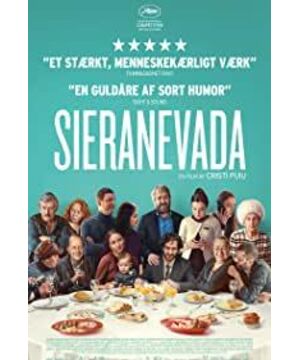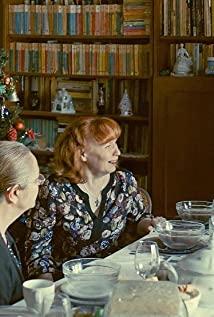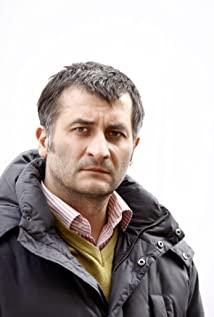Fortunately, Romanian director Cristi Puyo's "House of Snow Mountains" fits this description, and what is even more commendable is that this Eastern European film sent to Cannes is not affected by the two "Cannes" and "Eastern Europe". Influenced by a label, there is no high-cold temperament at all. The screening hall of Vue West End, which can accommodate two or three hundred people, is full of seats, and the audience will not stop laughing as the plot progresses. I read the table four or five times in between, not because I wanted the movie to end earlier, but to silently scrutinize the paragraph structure of the entire film by noting the time.
The three hours are roughly divided into four parts. The first hour belongs to the stage construction. It is the process of the audience getting to know the characters and the plot. More importantly, it sets the tone for the whole film. In the midst of trivial matters, and the many conversations that turned from chat to quarrel, we had a clear premonition that this "family dinner" would not be peaceful. In the film, more than a dozen main characters appear in turns (in a very natural way, of course), and the explanation of their relationship gives way to the portrayal of the character's character, each with their own characteristics. In this film, which is dominated by dialogue rather than "acting", the character's idiosyncrasies are most of the time equated with her/his position and opinions behind it, and discussions (even quarrels) about 9/11 and Romanian society old and new are throughout. , which serves precisely to portray characters.
This is also the main reason behind why this "Home in the Snow Mountain" is so good-looking and engaging, at least it won't let the audience fall asleep. Looking back on this film, it seems that there is more talk than narrative on the surface, (because the confrontation between different viewpoints almost never stops), but in my opinion, it is still dominated by narrative, supplemented by discussion, and even further, Argument is actually in the service of narrative. In the chatter, whether it is political conspiracy theories or other social issues, the director has never expressed his attitude on whether the discussions themselves are worthwhile, let alone on which side he is on - if If I have to say something, in my opinion, there are more negatives than positives. More than one person in the play has expressed the helplessness and resentment of "you all stop talking to this blind BB, I want to eat" more than once, and it can be seen from the different attitudes of the protagonist's mother and aunt and sisters towards family and husband infidelity. , the director is actually more inclined to the pragmatic attitude of "no matter who is right or who is wrong, life is just as good".
The next half hour is a wonderful transition in preparation for the climax of the next third phase. The long-awaited priest finally arrived late, and the director spared no effort to record the entire memorial ceremony. Due to the solid foreshadowing in the first stage, the image of each character became more and more active and cute in this half hour, and the humorous atmosphere of the whole film gradually reached its peak. I don't know how others are, but I started liking this movie within half an hour anyway.
The hour after that is the third phase, which roughly corresponds to everything that happened between a family sitting down to the dinner table, the spoiler (Tony) intervening, the scramble for a parking space, and Larry's recollection of his father's The long talk, with Zhang and relaxation, pushes the mood of the film to a new climax. In this hour, we have become more and more aware of what the director wants to shoot for us. In our long and trivial life, there are actually many things and the classic "Bunue" of "want to eat but can't". It's annoying, confusing, and over time you don't want to look for the exact answer. As a doctor, Larry didn't want to answer whether his aunt's symptoms were dangerous, and used a very formal and professional "official tone" to reply to his uncle's inquiry, "We'll let you know when we have news," perhaps secretly saying, In the end, life has become our 9-to-5 job. There are no superfluous emotions, no absolute values, and no noble pursuits. There are only some habits that have to be repeated and followed, and due responsibilities and obligations. That's it.
It's a full-on life movie. If the director was still using politics, religion, and social issues as a pretext for the first hour and a half, then in the next hour, the book of life was finally opened, and we began to comment word by word on what was written on it. It doesn't make sense.
The fourth stage is the last half hour. The calm after the storm is dominated by empty shots without dialogue. Even dialogues are nutritious like "Come on, give me a spoonful of mashed potatoes", which has no meaning to promote the plot. content is mostly. The three brothers finally sat in front of the dining table and looked at each other, until everyone started laughing when they looked at each other, and the film ended in a very simple and meaningful way, with a light weight, atmosphere, and no sense of contrived. We also saw a little sincerity of the director.
In general, this film, which is based on the theme of Buñuel's "The Discreet Charm of the Bourgeoisie", uses the length of a typical Romanian film to tell a story through a single space, multiple characters, intensive dialogue and scene scheduling, it is still very worthwhile. one look. The name of the movie "Snow Mountain Family" is very unpretentious, and even a bit misleading, because this family is neither as cold as ice and snow, nor as closed and unsophisticated as the people in the mountains. On the contrary, in this family (or several families) we have seen, from old to young, everyone has different vigor and enthusiasm. In the face of various unsatisfactory and ups and downs, they still dare to use what they think is the most correct. In a positive way, even "inaction" is due to the overall situation and is by no means passive. The fullness of the characters' characters and their fullness of attitude towards life (even fate) supports this full film.
"The New York Times" said in the film review that "House of the Snow Mountain", like many other NYFF films, is also about humanity, and here it is about selfishness, because selfishness is also a very important part of human nature. Writing here, I seem to understand the author's meaning a little bit. Life is never a matter of course. Nine times out of ten, you can't be as chic as you come. You should strive for it when you need to fight, persist when you need to persevere, and be yourself. Being worthy of yourself may be the real positive side behind this selfishness.
View more about Sieranevada reviews











